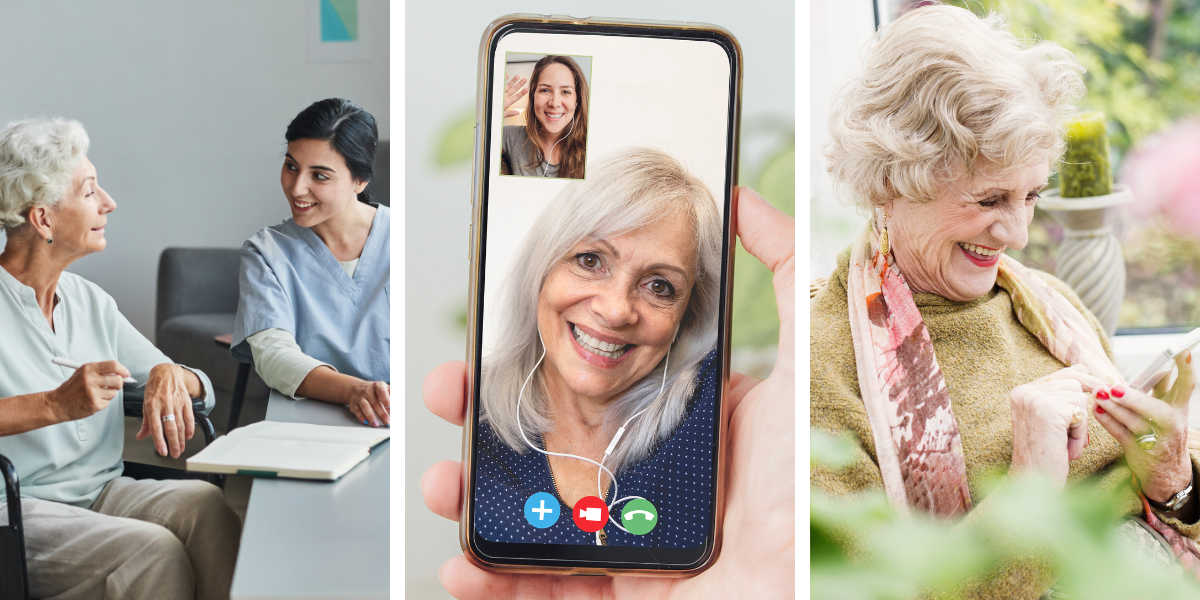
Helping Seniors with Digital Literacy
July 6, 2022For the past twenty or so years, it’s been a common stereotype that older adults do not understand digital technologies. Younger generations lament and laugh over their parent’s struggles with supposedly “simple tasks” over technology. This is a key example of the digital divide, which expresses the vast differences in technological understanding between seniors and younger generations.
During the pandemic, however, many realized just how much of a problem a lack of digital literacy skills can be. Without regular visits from family and friends, those who couldn’t operate their digital devices found themselves isolated from the world. Suddenly, the importance of helping seniors with digital literacy became crystal clear.
If your older loved one struggles with the ins and outs of their personal computer, cellphone, or tablet, take the time to help them. It will allow them to remain independent, keep in contact with others, and even keep their minds sharp
Schedule dedicated times for teaching
It’s all too easy to get distracted by small talk when you visit your elderly loved one. To make sure you work on your loved one’s digital literacy skills, set a specific time for the two of you to work together. Treat these sessions almost like a class for your loved one.
Be mindful of the length of these meetings. If the session is too long, you’ll likely overwhelm your loved one with too much information. Start with 30 minutes and go from there.
Start with the basics
You can’t dive into all the fun intricacies of digital tools if your loved one doesn’t first understand how to open a browser to connect to the internet. Make sure your loved one is familiar with the basics of operating their device. This may be tedious for you but put it in perspective. Think about how difficult it would be to learn trigonometry if you didn’t first understand algebra.
Educate them about cybersecurity
Once they have a grasp of the basics, express to them the importance of cybersecurity. Many seniors may not realize something is a scam or malware before it is too late. Teach them the signs to look out for (fake email addresses, unprompted messages about “winning a prize, etc).
Show them how to install cybersecurity software. Have them download a browser extension that avoids pop-ups. Teach them to not click on fishy ads. For ease of access, have them store all of their accounts’ passwords in an easy-to-remember location somewhere in the home.
Avoid using technical jargon
Terms that might be second nature to you by now, like “DM” and “URL,” will likely be confusing to a senior who hasn’t heard these terms before. Instead of using the shorthand for these phrases, use the full phrase– “direct message” instead of “DM” and “website address” instead of URL. Introduce these terms when they seem more comfortable.
Discuss media literacy
According to a study out of Princeton and NYU, prior to the 2016 election, seniors were seven times more likely to consume and share articles from fake news domains than those under 29. Teach them to how to spot misinformation, and what some prominent fake news sites are. Suggest lateral reading as a technique for consuming news. In this technique, you open up another window and Google the source of whatever article you’re reading. Your loved one will become a more thoughtful reader as a result.
Sign them up for a class
Teaching isn’t for everyone. That’s okay. Thankfully, there are plenty of organizations specifically designed to help seniors increase their digital skills.
Cyber-Seniors pair older adults with young adults who serve as their technology mentors. Generations on Line offers consulting and teaching materials. Senior Planet offers free virtual classes for seniors on a variety of topics, including tech.
Be patient
We all know the phrase, “you can’t teach an old dog new tricks,” but that simply isn’t true. The fact of the matter is, that seniors are not only able to learn, but willing. That being said, all seniors undergo some physical and mental changes that may make learning a little more difficult than it once was.
Be patient with your elderly loved one. Chances are, you’re going to have to repeat yourself several times before information sticks. Consider creating a sheet of quick information for your loved one to reference after your lessons. Though it may be frustrating at times, helping seniors with digital literacy is a rewarding endeavor.
Care in the comfort of your home
In-home caregivers can help your elderly loved one continue to live in the comfort and independence of their home. Our staff is made up of a patient and kind individuals who will provide your loved ones with the support they need.
Call us at 773-274-9262 to learn more about our companionship, personal care, medication reminders, and other home care services.
Articles:
-
How to Use FaceTime: a Senior’s Guide
March 20th, 2024 -
The Best Organic Cleaning Products for Caregivers
March 19th, 2024 -
Celebrating St. Patrick’s Day with Seniors
March 14th, 2024 -
Intellectual Activities for Seniors to Keep their Brains Stimulated
March 13th, 2024 -
Tips for Communicating with Seniors with Hearing Loss
March 12th, 2024 -
How to Learn a New Language as an Older Adult
March 7th, 2024 -
Foods that Support Bone Health in Seniors
March 6th, 2024 -
A Note to Our Staff for Caregiver Appreciation Day
March 1st, 2024 -
The Importance of a Senior/Caregiver Bond
February 21st, 2024 -
Recreational Sports as Fitness for Seniors
February 27th, 2024 -
Exploring the Wonders of Reminiscence Therapy
February 15th, 2024 -
Staying Educated on Alzheimer’s Disease and Dementia Care
February 14th, 2024
Call Now! 773.274.9262







